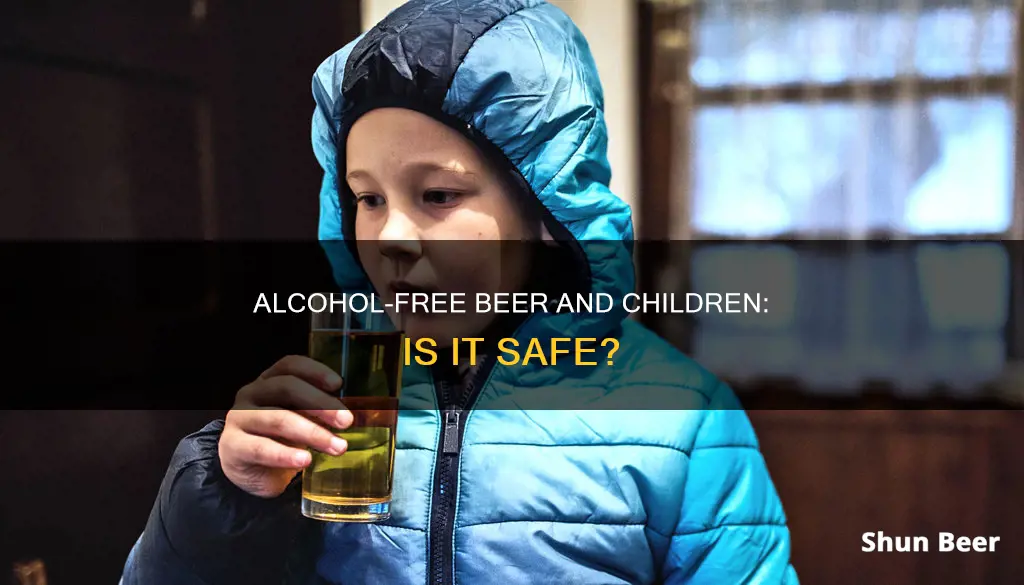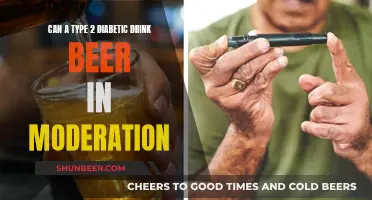
Actress Kristen Bell revealed that her 8 and 9-year-old daughters enjoy drinking non-alcoholic beer, which has sparked a debate about whether it is appropriate for children to consume such beverages. While there is no legislation prohibiting minors from buying or consuming non-alcoholic drinks, some people argue that it could normalise alcohol consumption for children and potentially increase their interest in drinking alcohol when they are older. On the other hand, some people argue that non-alcoholic drinks are no different from a soft drink and that allowing children to drink them in pubs could encourage younger people to use pubs and promote responsible drinking behaviour.
What You'll Learn

Alcohol-free beer may normalise drinking for children
Alcohol-free beer is a divisive topic when it comes to children. While some parents may see it as a harmless treat, others worry that it could normalise drinking for young people and increase their interest in alcohol.
From a legal standpoint, the Licensing Act 2003 in the UK defines "alcohol" as beverages with an alcohol by volume (ABV) of more than 0.5%alcohol-free beer, which typically has an ABV of less than 0.5%, is not considered alcohol under the law, and there are no restrictions on minors buying or consuming it. However, this lack of regulation is concerning for some experts and charities, who believe that alcohol-free drinks could condition children to drink alcohol in the future.
Research supports this view, suggesting that normalising the consumption of beer products at a young age can increase interest in alcoholic beverages. Dr Chloe Campbell, a paediatrician at Salem Hospital in Salem, Massachusetts, warns that "we plant the seed in young minds that beer drinking is OK". This is echoed by Professor Tim Slade from The Matilda Centre for Research in Mental Health and Substance Use, who draws parallels with tobacco research, where underage e-cigarette use has been shown to lead to adult nicotine and tobacco use.
Furthermore, serving alcohol-free beer to children can send the message that underage drinking is acceptable. As Professor Slade points out, giving minors "something that looks, smells and tastes like alcohol" could indicate that underage drinking is tolerated, even if it is only done infrequently or in small amounts. This view is shared by some pubs and alcohol companies, who have banned the sale of alcohol-free drinks to minors to avoid blurring the lines between soft drinks and alcoholic beverages. They argue that alcohol-free beer differs from traditional soft drinks because it looks and tastes similar to its alcoholic equivalents, making it difficult for staff and children to distinguish between the two.
While the potential risks of alcohol-free beer for children are not fully understood yet, it is clear that normalising drinking for young people could have negative consequences. Therefore, it is essential to approach this topic with caution and consider the potential impact on children's perceptions and behaviours regarding alcohol consumption.
Beer and Milk: A Safe Combination?
You may want to see also

There is no legislation around minors consuming non-alcoholic drinks
While some parents may be inclined to let their children drink non-alcoholic beer, there are differing views on the topic. Actress Kristen Bell has revealed that her daughters, aged 8 and 9, drink non-alcoholic beer, and have even ordered it in restaurants. She has stressed that there is no alcohol content in the drinks and that she is "not doing anything wrong". However, doctors and pediatricians say that this is not a wise decision due to the potential physical health risks.
There is currently no legislation around minors consuming non-alcoholic drinks. Under the Licensing Act 2003, "alcohol" is defined as drinks containing more than 0.5% ABV, so non-alcoholic drinks are not considered alcohol under the law. As a result, minors can legally purchase and consume these drinks in licensed premises such as pubs. Despite this, many licensed operators still choose to implement an age verification policy for non-alcoholic drinks to avoid unwittingly breaking the law and to reduce the risk of underage sales.
While there may be no legal restrictions, some people argue that giving minors non-alcoholic drinks could serve as a gateway to risky drinking behaviour and normalise the consumption of alcohol. Dr Amy Pennay, a senior research fellow from La Trobe University's Centre for Alcohol Policy Research, states that there is evidence from tobacco research that underage e-cigarette use is a gateway to adult nicotine and tobacco use. Similarly, Professor Tim Slade from The Matilda Centre for Research in Mental Health and Substance Use suggests that drinking non-alcoholic beers that look like beers could set kids up for risky alcohol consumption in the future.
Furthermore, Dr Chloe Campbell, a pediatrician at Salem Hospital in Salem, Massachusetts, warns that research shows that teens who have consumed non-alcoholic beer have more interest in consuming alcoholic beverages. Normalizing the consumption of beer products can also be confusing for children, who may not understand the difference between alcoholic and non-alcoholic drinks. In addition, Dr Marc Auerbach, a pediatric emergency medicine specialist at Yale University School of Medicine, emphasizes that introducing the ritual of drinking beer is especially risky for children with a genetic predisposition to substance use disorder.
Drinking and Driving: Is it Safe to Drive After Beers?
You may want to see also

Alcohol-free beer can contain trace amounts of alcohol
Alcohol-free beer is legally defined as a beverage containing less than 0.5% alcohol by volume. This means that alcohol-free beer can contain small amounts of alcohol, up to the 0.5% threshold. This is because it is difficult to remove all the alcohol from the beverage during the brewing process. Therefore, it is important to understand that alcohol-free beer is not completely free of alcohol and can contain trace amounts.
The presence of trace amounts of alcohol in alcohol-free beer has important implications, especially when it comes to consumption by minors. While there is no specific legislation prohibiting minors from consuming alcohol-free beverages, the decision to allow children to drink them remains controversial. Some parents may view alcohol-free beer as a safer alternative to regular beer, while others worry that it could serve as a "`gateway`" to future alcohol consumption.
The potential risks associated with minors consuming alcohol-free beer are twofold. Firstly, there is a risk of normalizing alcohol consumption. By introducing young people to beverages that imitate the flavour, packaging, and appearance of alcohol products, there is a concern that it may increase their interest in trying the "real thing". Research supports this idea, suggesting that teens who have consumed non-alcoholic beer exhibit more interest in consuming alcoholic drinks.
Secondly, there is a risk of accidental consumption of alcoholic beverages. If children are accustomed to drinking alcohol-free alternatives, they may not fully understand the difference between these and regular alcoholic drinks. This could lead to situations where they mistakenly consume alcoholic beverages, which can have dangerous consequences. Therefore, it is crucial to provide clear communication and education to minors about the distinctions between alcohol-free and alcoholic drinks.
In conclusion, while alcohol-free beer may legally contain trace amounts of alcohol, it is important to exercise caution when considering its consumption by minors. The potential risks of normalizing alcohol consumption and accidental consumption highlight the need for careful consideration and parental guidance when making decisions about alcohol-free beverages for children.
Beer and Stomach Infection: Is It Safe to Drink?
You may want to see also

Some pubs refuse to serve alcohol-free beer to under-18s
Alcohol-free beer does not count as alcohol under the Licensing Act 2003, which defines alcohol as beverages with an ABV of over 0.5%. This means that it is legal for under-18s to purchase and consume alcohol-free beer in pubs. However, some pubs choose not to serve alcohol-free beer to under-18s due to concerns about the potential risks and negative perceptions associated with this practice.
Some pub owners and managers worry that serving alcohol-free beer to minors could blur the lines and potentially increase the risk of underage alcohol consumption. They argue that alcohol-free beer still contains a small amount of alcohol (up to 0.05% ABV) and that it looks and tastes similar to its alcoholic counterpart, which could normalize alcohol consumption for young people and make it difficult for staff to distinguish between alcoholic and non-alcoholic drinks once served.
Additionally, there is a concern that allowing minors to drink alcohol-free beer in pubs could be perceived as promoting alcohol to children. Some believe that it sends the wrong message about underage drinking and could potentially encourage them to try the "real thing." This perception could damage the reputation of pubs and lead to negative consequences, such as losing customers or facing criticism from the community.
To avoid these potential risks and maintain a consistent policy, some pubs choose to implement an age verification process for all alcoholic and non-alcoholic drinks, requesting proof of ID for anyone who appears to be under the age of 18. While this approach may be more cautious than legally required, it helps ensure compliance with underage sales laws and reduces the risk of unintentionally serving alcohol to minors.
It is worth noting that there are also differing opinions on the matter. Some people, including parents and pub owners, believe that allowing under-18s to drink alcohol-free beer can be beneficial. They argue that it helps children learn how to behave responsibly in adult society and encourages them to use pubs, which can contribute to the social well-being of communities.
Drinking Beer on the Strip: What You Need to Know
You may want to see also

Doctors advise against children drinking non-alcoholic beer
While non-alcoholic beer is not illegal for children to consume, doctors advise against it. Non-alcoholic beer is defined as containing less than 0.5% alcohol by volume, but it is not classed as alcohol under licensing laws.
Despite this, doctors say there are physical health risks when it comes to children drinking these beers. Pediatricians explain that even non-alcoholic beer could increase the risk of addiction. Research shows that teens who have consumed non-alcoholic beer have more interest in consuming alcoholic beverages. Dr Chloe Campbell, a pediatrician at Salem Hospital in Salem, Massachusetts, says that "we plant the seed in young minds that beer drinking is OK". She adds that normalising the consumption of beer products can be confusing for children, who may not understand the difference between alcoholic and non-alcoholic drinks.
The Alcohol and Drug Foundation has called for zero-alcohol beverages to be regulated in the same way as full-strength products, as they could condition young people to drink alcohol in the long term. Dr Amy Pennay, a senior research fellow at La Trobe University's Centre for Alcohol Policy Research, agrees that non-alcoholic drinks could serve as a "gateway" to alcohol consumption. Professor Tim Slade from The Matilda Centre for Research in Mental Health and Substance Use also highlights the risk of normalising underage drinking, even if it is only "small sips" of alcohol or "just one beer".
Given these risks, doctors recommend that parents encourage their children to wait until they are 18 to drink alcohol. The longer someone holds off from drinking alcohol, the less likely they are to be a "problematic drinker" as they age.
Hines Park, Michigan: Beer Drinking Allowed?
You may want to see also
Frequently asked questions
No, alcohol-free beer can contain up to 0.05% ABV.
There is no legislation around minors buying or consuming non-alcoholic beer. Under the Licensing Act 2003, alcohol is defined as drinks containing more than 0.5% ABV. Therefore, a child can legally drink alcohol-free beer.
Pediatricians say there are physical health risks when it comes to children drinking alcohol-free beer. Even without alcohol, drinking these beverages could increase the risk of addiction and normalise alcohol consumption.
Some parents are against the idea as they believe it could influence their children to want alcoholic drinks. Other parents are okay with their children drinking alcohol-free beer, especially if it is in a family setting.
Some pubs choose not to serve alcohol-free beer to children as they believe it promotes alcohol to minors and could confuse staff. Other pubs view it as a positive, believing it encourages younger people to use pubs and promotes the social aspect of pubs within communities.







